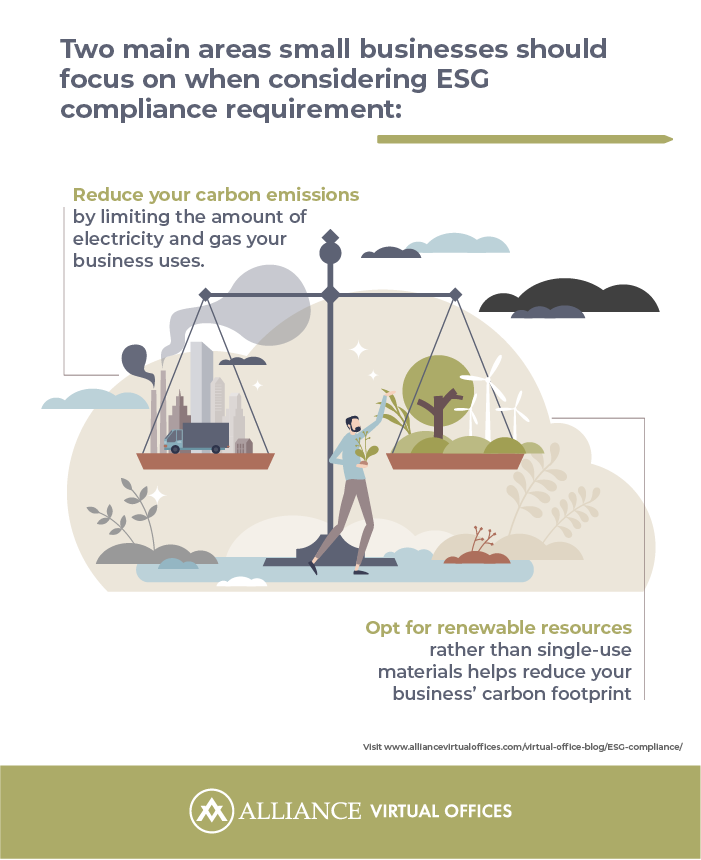- What is ESG?
- What makes a company or business ESG compliant?
- How does improving ESG compliance impact your business?
Q: Should I focus on making my small business more ESG compliant?
A: With ESG compliance becoming an increasingly important factor of investing decisions, it’s almost certainly a good idea to make your business ESG compliant. Doing so is both ethically right and stands to help your business grow into the future. This article covers ESG compliance and how it interacts with small business practices.
When we look to the future, we tend to picture progress. We imagine the future will be cleaner and more technologically advanced, with abundant artificial intelligence and a greater emphasis on equality.
That’s the future we hope for –but sometimes hope isn’t enough. The last few years have been plagued by environmental disasters, pandemic, and increasing social unrest.
More and more, people are realizing that simply letting the calendar change isn’t enough to usher in the bright future we hope for. That’s why a universalized ESG compliance framework is gaining increasing attention today.
According to Pew Research Center, a majority of Americans think climate change action should play a larger role in our society for the sake of future generations. This highlights the growing push behind ESG requirements and certifications.
Despite its growing popularity, ESG is still a relatively new idea. As such, many small businesses aren’t entirely sure what ESG is – or how it might affect their operations.
If this sounds familiar, don’t worry. After reading this article, you’ll know all about ESG compliance certification, what it means, and how you can raise your business’s rating.
- What is ESG?
- Why is ESG gaining so much traction?
- How can you make your small business more ESG compliant?
- What impact does improving ESG compliance have on your small business?
What is ESG?
ESG stands for environmental, social, and governance, and this acronym typically refers to a set of standards used to evaluate a business’ ethical and environmental impacts on the world.
While there isn’t a singular, definitive ESG compliance checklist, there are some basic concepts that can help you understand how an ESG rating is evaluated.
ESG Compliance Meaning
- The environmental component of ESG is relatively obvious. It evaluates a business’ carbon footprint and how they impact the environment.
- The social element of ESG is a bit more complex. It considers both a business’ impact on its community, how it treats its workers, and how it interacts with other businesses and organizations.
- Finally, the “G” in ESG refers to the governance of the business. In other words, how a business manages and organizes itself.
We’ll get into the specifics of these three elements in a moment, but first, let’s look at why ESG matters.
Why is ESG Becoming So Important?
ESG is playing an increasingly important role in almost all aspects of our modern society. Biden is taking steps to make the government carbon neutral, and there is increasing pressure to pass legislation that would encourage or force businesses to do the same.
With this renewed push towards green energy, it’s more important than ever before for businesses to pay attention to their ESG ratings. Those that simply ignore this trend may find themselves in an awkward position when new legislation passes, as they may face fines or be forced to make sweeping changes. This could severely interrupt their business operations.
Additionally, investors and consumers are increasingly driven by ESG considerations. According to Forbes, there is a marked demand for increased ESG reporting and transparency in multiple nations.
With the general public becoming more concerned with environmental and social business practices, it seems clear that businesses will need to comply if they want to remain profitable.
Consumers are less likely to buy products from a business with a poor ESG compliance rating, and modern investors are often reluctant to put their money into unethical businesses.
Aside from the financial consequences of dismissing ESG compliance, there are also obvious ethical and environmental factors to consider. Global warming and labor exploitation are just plain bad for everyone. Businesses must do their part to help combat these issues
What Makes a Business ESG Compliant?
Businesses can raise their ESG compliance scores by changing how they function environmentally, socially, and governmentally
From an environmental perspective, there are two main areas small businesses should focus on when considering ESG compliance requirements:
Firstly, you can reduce your carbon emissions by limiting the amount of electricity and gas your business uses. This can significantly improve your business’ ESG rating.
You can do this by promoting remote work (thus eliminating commuting), opting for green shipping options, and eliminating plastic use whenever possible.
Secondly, you can think about how you source your materials. Opting for renewable resources rather than single-use materials helps reduce your business’ carbon footprint.
You should also consider the carbon footprint of your resource production. Some materials are sourced from renewable resources, but processing them requires massive energy demands, negating the positive impact they have on the environment.
When it comes to the social element of ESG, consider helping your community by giving back through charitable donations or volunteering. You can also encourage your employees to volunteer, further boosting your ESG.
Speaking of your employees, treat them well. Make sure they are compensated while prioritizing mental health initiatives.
Try to adopt a general attitude of humanitarianism in your business practices. Not only will this leave you with a clear conscience, but it will also improve your ESG rating.
Finally, you need to figure out how to tackle the governance aspect of ESG.
When it comes to governance, the best way to improve your ESG score is to make things as equitable and democratic as possible. Allow shareholders and employees to vote on important business decisions, and make sure everyone feels genuinely heard and acknowledged.
If you incorporate these tips, your business’ ESG score will improve. More importantly, you’ll be contributing to a brighter future for everyone.
How Does ESG Compliance Affect Your Business?
Aside from the obvious moral and environmental benefits, a high ESG compliance score will likely accelerate your business growth and ensure your business’s longevity.
With the government moving towards higher ethical and environmental standards at an increasing pace, it’s clear that moving in the same direction now will make things easier down the road.
If you adopt sound business practices today, you won’t be caught off-guard when the legislation suddenly changes. This means your business will continue running smoothly, ensuring high-profit margins and preventing unnecessary setbacks.
Additionally, higher ESG scores will likely boost sales due to a consumer market that is more concerned about sustainability than ever before. The same goes for potential investors, who will likely see your business as a much more attractive prospect if you obtain a positive ESG score.
ESG is a net win for your business, society, and the planet itself.
Conclusion
ESG compliance will only continue to garner support as we move forward. Our governments and societies are placing increasing emphasis on ethical and environmentally-friendly business practices.
Being ESG compliant is good for your business, plain and simple. When you emphasize giving back to the community, treating employees fairly, and reducing your carbon footprint, your business will succeed and the world will thank you.
If you’re looking for an easy way to reduce your emissions, working from home is a fantastic strategy. Remote workers avoid tedious commutes while reducing their entire organization’s use of fossil fuels.
Further Reading
- ESG Investing and Analysis.
- What is ESG Investing? – NerdWallet
- Small Business Ideas: 10 Vital Areas to Focus on For Maximum Growth
- Environmental, Social And Governance: What Is ESG Investing?
A virtual office from Alliance Virtual Offices can help you achieve your ESG goals. By using a virtual office, you gain all the benefits of a normal, registered business while allowing your workers to work remotely.
Gain freedom and flexibility while boosting your ESG compliance with a virtual office from Alliance Virtual Offices.







